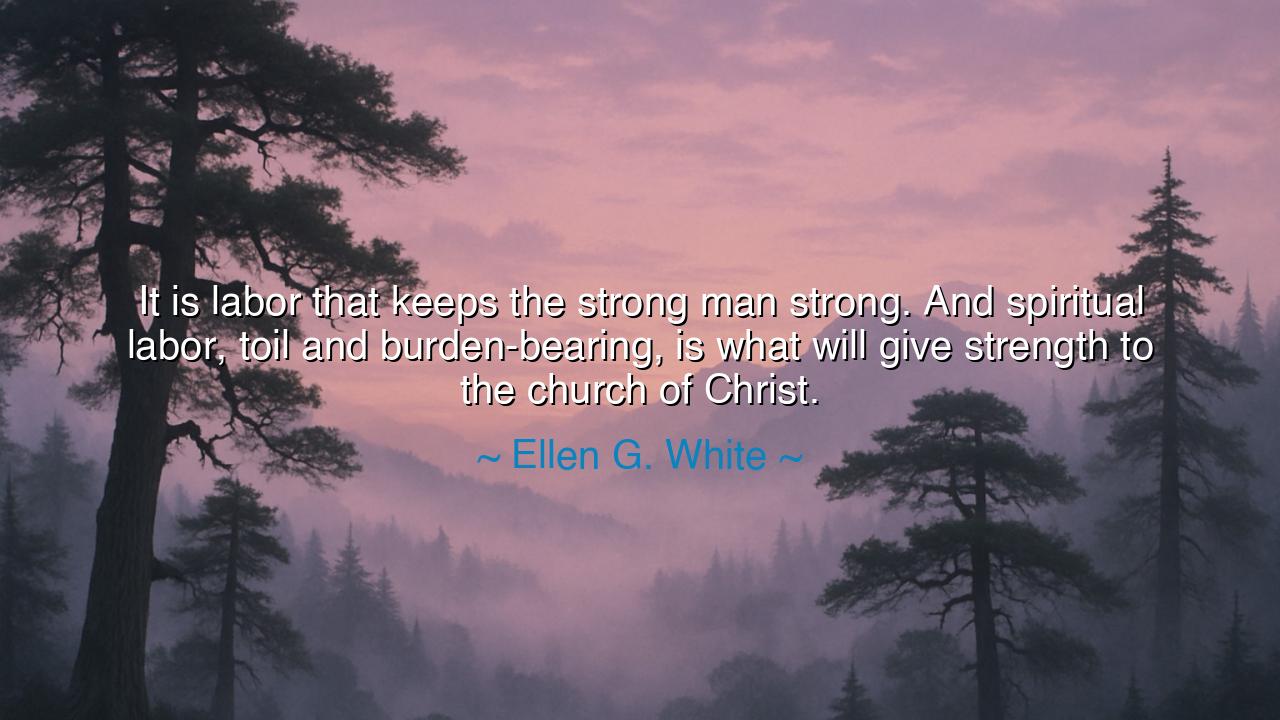
It is labor that keeps the strong man strong. And spiritual
It is labor that keeps the strong man strong. And spiritual labor, toil and burden-bearing, is what will give strength to the church of Christ.






In the words of Ellen G. White, the prophetess and reformer of the nineteenth century, we hear a clarion call to perseverance and devotion: “It is labor that keeps the strong man strong. And spiritual labor, toil and burden-bearing, is what will give strength to the church of Christ.” These words remind us that strength is not a possession that remains forever, but a flame that must be fed, a muscle that must be exercised, a spirit that must be tested in the furnace of effort. Without labor, both the body and the soul decline into weakness. With labor, they are fortified and endure.
The first part of her saying points to the reality known since the dawn of mankind: it is labor that keeps the strong man strong. The farmer who plows, the smith who hammers, the soldier who trains—each finds his strength not by rest, but by struggle. Just as the tree that weathers storms grows roots deeper than one sheltered in still air, so too does man find his endurance through toil. Idleness may seem a comfort, but it is in truth decay disguised as peace. Strength is preserved not by avoiding burden, but by bearing it with courage.
The second part of her teaching ascends to a higher plane: spiritual labor, toil, and burden-bearing, is what will give strength to the church of Christ. Here White declares that just as the body requires exercise, so too does the soul require struggle. Prayer, service, sacrifice, and the lifting of one another’s burdens are the exercises of the spirit. A church that seeks only ease, that avoids hardship, that hides from the suffering of the world, will grow soft and powerless. But a church that labors—visiting the sick, feeding the hungry, comforting the broken—will grow strong, unshakable, and radiant with divine power.
The ancients themselves spoke of this truth in their own tongue. The philosopher Epictetus taught that hardship is the school of the soul, saying, “Difficulties show a man to himself.” The early Christians lived this out, carrying one another’s burdens in times of persecution. When Rome sought to crush them, their strength did not falter, for their labor was not of the body alone, but of the spirit. In their prisons, in their secret gatherings, in their care for the poor, the early church proved White’s words centuries before she spoke them: that toil for others gives strength that no empire can destroy.
Consider the life of Mother Teresa, who walked the streets of Calcutta centuries after the first church was formed. Her body was frail, her resources scarce, yet her strength was immense. Why? Because she bore the burdens of the dying and the destitute. Her labor was not physical might, but spiritual perseverance. And through her toil, the church itself was strengthened, for millions saw in her the living image of Christ’s compassion. Her story is a witness to White’s truth: strength comes through service, and vitality through burden-bearing.
From this, the lesson for us is luminous: seek not strength in ease, but in labor. Do not fear the toil of daily life, nor shrink from the burdens of the spirit. If you would be strong in body, embrace the work of your hands. If you would be strong in soul, embrace the work of compassion, patience, and sacrifice. For strength, whether physical or spiritual, is not inherited, but forged—hammered out on the anvil of effort and service.
Practically, this means engaging daily in both forms of labor. Take care of the body through work, discipline, and diligence. Do not shy away from responsibilities, for they sharpen you. At the same time, engage in spiritual exercises: lift up the weary, pray with sincerity, speak words of encouragement, carry the burdens of others as though they were your own. In such labor lies the secret to lasting strength, both for the individual and for the community.
So let us remember Ellen G. White’s wisdom: strength is sustained by labor, and the church is strengthened by burden-bearing. Do not despise toil, for it is the pathway to endurance. Do not flee hardship, for it is the proving ground of character. Instead, embrace labor as a gift, and let it shape you into a vessel strong enough to endure storms and radiant enough to shine with the light of Christ. For in labor lies not punishment, but power—power to live, to endure, and to bless generations yet to come.






AAdministratorAdministrator
Welcome, honored guests. Please leave a comment, we will respond soon